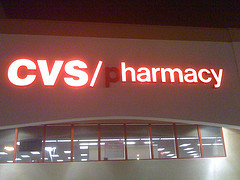Is CVS Pressuring Pharmacists To Refill Prescriptions Automatically? Image courtesy of (zipsonic)

(zipsonic)
The e-mails first came to light last week in David Lazarus’ L.A. Times column. They appear to reference the existence of, at the very least, an implied refill quota for pharmacists.
A CVS pharmacy supervisor, responsible for around 50 pharmacists in and around New Jersey, reportedly told employees that 30% of their calls to customers should result in return business. Those who didn’t meet this quota could face “major personnel changes,” according to Lazarus.
From the Times:
[E]mails instructed CVS pharmacists to watch for prescriptions for so-called maintenance medications for chronic illnesses that hadn’t been refilled on a regular basis. Pharmacists were advised to make at least four attempts to reach the patient by phone.
If the patient couldn’t be reached, the pharmacists were told to wait until Friday and then fill the prescription anyway.
Though reps for CVS deny that prescriptions are refilled without customers’ approval and that no quotas exist, Lazarus reports that one e-mail from the pharmacy supervisor states, “each of you owns scripts and has an obligation to meet your weekly script budget; this is one of the areas you’ll be evaluated on come review time.”
When Lazarus brought these e-mails to the attention of CVS HQ, a rep claimed, “The messages in the emails in question were not authorized by CVS pharmacy,” and that the company had already been made aware of this supervisor’s behavior and that it had “already addressed this matter… and educated the pharmacy teams about our correct policies and procedures.”
Apparently, “addressing the matter” does not mean “firing,” as that supervisor is still employed by CVS.
And the auto-refills appear to still be happening, at least in California. In his latest column, Lazarus claims to have heard from dozens of CVS customers with similar complaints.
One woman who takes a variety of medications for her osteoporosis says that “Three or four times… I’ve gone into the store to pick up one prescription and they’ll hand me others as well. I tell them I didn’t order the other medicines, and they say that they refilled them anyway.”
Lazarus also says that a number of current and former CVS pharmacists have come out of the woodwork to discuss the pressure they feel to make money from refills:
None of the pharmacists said they’d been given explicit instructions to refill prescriptions without patient approval. But a CVS pharmacist in Pennsylvania said he had received a call from his district manager after my column ran last week “telling us to stop the practice and only fill scripts if the patients want them.”
Meanwhile, a former CVS pharmacist in L.A. said that during his brief stint with the chain, some of his co-workers weren’t canceling claims and refunding money to insurers for prescriptions that had not been picked up.
“The insurance company may be paying for something that’s not being delivered,” said the executive officer of the California Board of Pharmacy. “Given the health premiums we pay, I can’t believe they would be happy about that.”
She says that if there are enough complaints filed against CVS in California, the board will investigate. So if you live in California and have had this problem with CVS, go to http://www.pharmacy.ca.gov.
Since there ultimately no loss to the insurance company if the patient never picks up the unwanted refill, some might say this isn’t that big a deal. But as one insurance insider explained to Lazarus, there can be a problem if the patient tries to get a refill elsewhere without knowing their prescription has automatically been refilled by CVS.
See, when CVS fills a prescription, it makes an initial claim to the insurer. If it’s not picked up, the claim will be canceled. But if someone tries to get that prescription filled elsewhere while that other refill is waiting to be picked up, the insurance company will likely deny the claim because it’s already been placed by CVS. So the patient has to go out of pocket or wait until the mess is cleared up.
Want more consumer news? Visit our parent organization, Consumer Reports, for the latest on scams, recalls, and other consumer issues.

